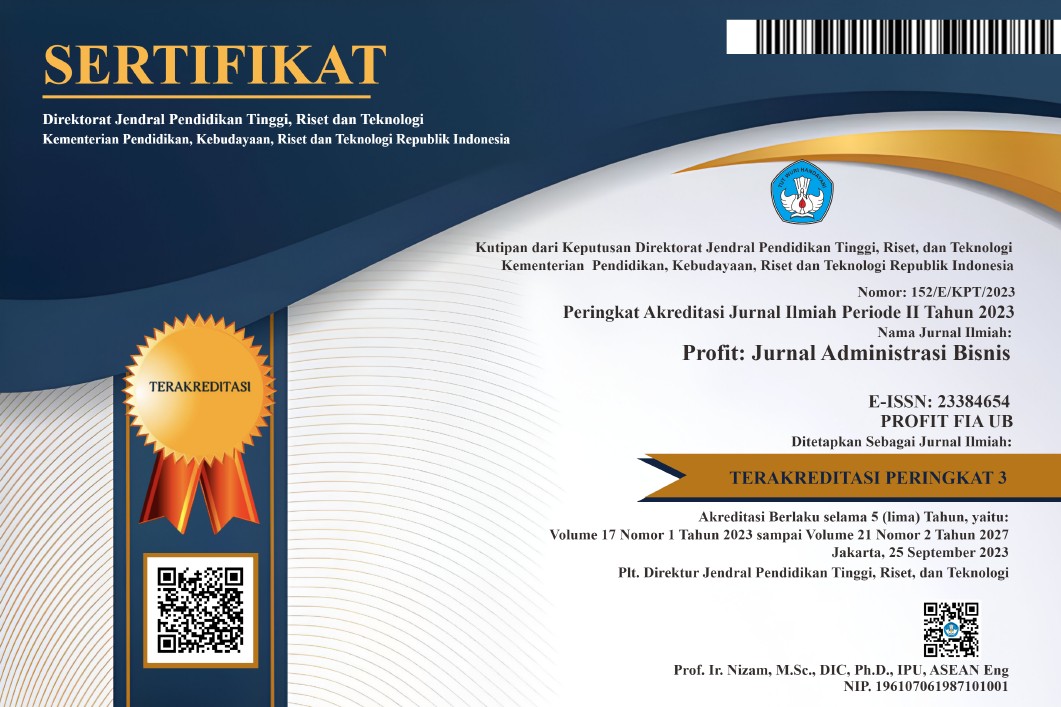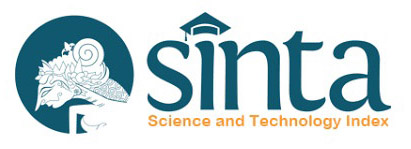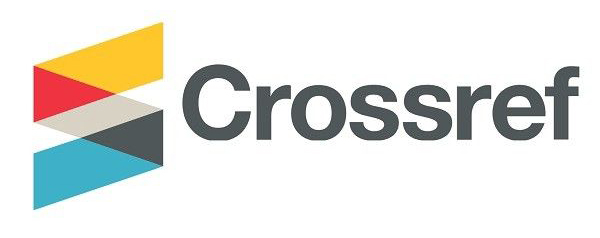EXPLORING THE IMPACT OF SOCIAL CAPITAL ON ENTREPRENEURIAL ORIENTATION AND BUSINESS PERFORMANCE (Study on Members of MSMEs Communities in Malang)
DOI:
https://doi.org/10.21776/ub.profit.2018.012.01.3Keywords:
Social Capital, Entrepreneurial Orientation, Business Performance, MSMEsAbstract
This research analyzes the relationship between social capital and business performance with entrepreneurship orientation as an intermediary variable. This research was conducted in 4 (four) communities of micro, small and medium enterprises (MSMEs) in Malang city with a population of 324 business actors. Proportional Cluster Random Sampling technique was applied, involving 90 respondents who are members of the MSMEs community. The data was gathered through questionnaires. The findings showed that social capital significantly affects entrepreneurial orientation as well as business performance. It is also found that Entrepreneurship Orientation has a significant influence on Business Performance. Lastly, it is found that the effect of Social Capital on Business Performance was mediated by Entrepreneurial Orientation.
Â
Â
References
Abdillah, Willy dan Jogiyanto. (2015). Partial Least Square (PLS), Alternatif Structural Equation Modeling (SEM) dalam Penelitian Bisnis [Partial Least Square (PLS) as an alternative of Structural Equation Modeling (SEM) on Business Research]. 1st Edition. Yogyakarta: ANDI
Adler, P. S., Kwon Seok-Woo, (2002). Social Capital: Prospect A New Concept. Academy of Management Review 2002, Vol.27, No. 1, 17-40.
Alam, Syed Shah, Rohani Mohd, Badrul Hisham Kamaruddin, Noor Gani Mohd Nor, (2013). Personal values and entrepreneurial orientations in Malay entrepreneurs in Malaysia Mediating role of self-efficacy. International Journal of Commerce and Management Vol. 25 No. 4, pp. 385-401
Alarcon, Job Redrigo, Pedro M Gracia, Maria J. Ruiz Ortega, (2017). From social capital to entrepreneurial orientation: The mediating role of dynamic capabilities. European Management Journal
Arikunto, Suharsimi. (2006). Prosedur penelitian suatu pendekatan praktis [The research procedure is a practical approach]. VI revision edition. PT. Rineka Cipta. Jakarta.
BPS. (2006). Analisis Profil Perusahaan / Usaha Indonesia: Hasil Pendafttaran Perusahaan/Usaha Sensus Ekonomi 2006 [Analysis of Indonesia Company/Business Profile: Results of Company/Business Registration / Economic Census 2006]. BPS Katalog, 9102004. Jakarta
BPS. (2016). Keadaan Ketenagakerjaan Februari 2016 [Labor Conditions on February 2016]. Official Statistic News of Statistic Indonesia. No. 46/05/Th. XIX.
BPS. (2016). Profil Kemiskinan di Indonesia September 2015 [Profile of Poverty in Indonesia on September 2015]. Official Statistic News of Statistic Indonesia. No. 05/01/Th. XIX.
Burt, RS. (2009). Structural holes: The social structure of competition, Harvard University Press.
Burt, R.S., (2000). The network structure of social capital In: Staw, B.M., Sutton, R.I. (Eds.), Research in Organizational Behavior. Elsevier Science JAI, Amsterdam, London and NewYork, pp. 345–423.
Boso, Nathaniel, Vicky M. Story, John W. Cadogan, (2013). Entrepreneurial orientation, market orientation, network ties, and performance: Study of entrepreneurial firms in a developing economy. Journal of Business Venturing 28 (2013) 708–727
Bowles, S & Gintis, H, (2002). Social capital and community governance, Economic Journal, vol. 12, no. November pp. 419-436.
Casson, M., Yeung, B., Basu, A., and Wadeson, N. (ed). (2006). The Oxford Handbook of Entrepreneurship. New York: Oxford University Press Inc.
Chen, Cheng Nan, Lun-Chung T, Wei-Ming A., (2007). The Relationship among Social Capital, Entrepreneurial Orientation, Organizational Resources and Entrepreneurial Performance for New Ventures. Contemporary Management Research, Vol 3, No. 3 pp. 213-232.
Coleman, James S. (1988). Social Capital in the Creation of Human Capital. The American Journal of Sociology, Vol. 94.
Coleman, James S., (1990). Foundations of Social Theory. The Bellknap Press Of Harvard University, Cambridge, MA
Conner, K. R., (1991). A historical comparison of resource-based theory and five schools of thought within industrial organization economics: do we have a new theory of firms? Journal of Management, 17(1), 121-154.
Covin, J. G., and Slevin, D. P., (1989). Strategic management of small firms in a hostile and benign environment. Strategic Management Journal, 10, 75-87.
Croitoru, Alin., (2012). Schumpeter, J.A., 1934 (2008), The Theory of Economic Development: An Inquiry into Profits, Capital, Credit, Interest and the Business Cycle, translated from the German by Redvers Opie, New Brunswick (U.S.A) and London (U.K.) Transaction Publishers: A review of a book that is 100 years old. Journal of Comparative Research in Anthropology And Sociology, Vol 3, No. 2.
Dai, Weiqi (David), Zhenxing (Eddie) Mao, Xinyuan (Roy) Zhao, Anna S. Mattila. (2015). How does social capital influence the hospitality firm’s financial performance? The moderating role of entrepreneurial activities. International Journal of Hospitality Management, Vol 51, pp 42-55.
Davidson, M., and Burke, R., (2004). Women in Management Worldwide: Facts, Figures, and Analysis. Ashgate: Cornwall.
Dimon, Ron. 2013. Enterprise Performance Management. Wiley CIO Series.
Ejdys, Joanna., (2016). Entrepreneurial Orientation vs. Innovativeness of Small and Medium Size Enterprises. Journal of Engineering, Project, and Production Management. 2016, 6(1), 13-24
FelÃcio, J. A., Cuoto E., Caiado, J., (2014). Human capital, social capital and organizational performance. Management Decision, Vol. 52 Issue. 2, pp.350 – 364.
Fernandez-Mesa, Anabel & Joaquin Alegre., (2015). Entrepreneurial orientation and export intensity: Examining the interplay of organizational learning and innovation. International Business Review, Vol. 24 Issue 1, pp. 148-156.
GEDI. (2016). Global Entrepreneurship Index 2016. The Global Entrepreneurship and Development Institute.
Gelderman, Cees J., Janjaap Semeijn, Patrique P. Mertschuweit, (2016). The impact of social capital and technological uncertainty on strategic performance: The supplier perspective. Journal of Purchasing & Supply Management.
Ghozali, Imam. (2008). Structural Equation Modeling, Metode Alternatif Dengan Partial Least Square [Structural Equation Modeling, alternative method of Partial Least Square]. Semarang. Undip Press.
Hair, J., Anderson, R., Tatham, R. & Black, W. (1995). Multivariate data analysis. 7th Ed. Pearson Prentice Hall. New Jersey.
Hartono, Rudy, Suegianto, Enny Noegraheni H. (2013). Analisis Pengaruh Modal Sosial dan Orientasi Kewirausahaan terhadap Kinerja Kewirausahaan pada PT. Mentari Esa Cipta [Analysis of the Effect of Social Capital and Entrepreneurial Orientation on Entrepreneurship Performance at PT. Mentari Esa Cipta]. Undergraduate Thesis, BINUS.
Inkpen, A.C., Tsang, E.W.K., (2005). Social capital, networks, and knowledge transfer. Academic of Management Review. 30 (1), 146–165.
Kale, P., Singh, H., Perlmutter, H., (2000). Learning and protection of proprietary assets in strategic alliances: building relational capital. Strategic Management Journal. 21 (2), 217–228.
Kementerian Koperasi dan UKM [Ministry of Cooperation and Small Medium Enterprises]. (2012). Kemenkop Matangkan Skim Kredit Khusus bagi Wirausaha Pemula. http://www.depkop.go.id/content/read/kemenkop-matangkan-skim-kredit-khusus-wirausaha-pemula/.
Khoirrini, L., Kartika L. (2014). Pengaruh Modal Insani dan Modal Sosial terhadap Kinerja: Studi Kasus Usaha Kecil dan Menengah (UKM) Makanan dan Minuman Kota Bogor [Influence of Human Capital and Social Capital on Performance: Case Study of Small and Medium Enterprises (SMEs) Food and Beverage in Bogor]. Jurnal Manajemen dan Organisasi, Vol V, No 3, December 2014.
Levine, D.M., Stephan D.F., Krehbiel T.C., Berenson, M.L, (2011). Statistic for managers: using Microsoft Excel. New Jersey: Prentice Hall.
Liu, H., Ding, X.-h., Guo, H., and Luo, J.-h. (2014). How does slack affect product innovation in high-tech Chinese firms: The contingent value of entrepreneurial orientation. Asia Pacific Journal of Management, 31(1), 47-68.
Manson, M.C., Jasonanco F, Stefano M, Federic B, Roberto C., (2015). Understanding the Impact of Entrepreneurial Orientation on Smes’ Performance. the Role of the Financing Structure. Procedia Economics and Finance. Vol. 23, pp. 1649-1661.
Martin, S.L., and Javalgi, R.G., (2016). Entrepreneurial Orientation, Marketing Capabilities, and Performance: The Moderating role of Competitive Intensity on Latin American International New Ventures. Journal of Business Research. Vol. 69 Issue 6, pp. 2040–2051.
Mattessich, P. W., (2009). Social capital and community building. In R. Phillips & .H. Pittman (Eds.), An introduction to community development. pp. 49-57. London: Routledge.
Molina-Morales, FX & Martinez-Fernández, MT., (2010). Social networks: effects of social capital on firm innovation, Journal of Small Business Management vol. .48, no. 22, pp. 258-279.
Munizu, Musran. 2010. Pengaruh Faktor-Faktor Eksternal dan Internal Terhadap Kinerja Usaha Mikro dan Kecil (UMK) di Sulawesi Selatan [The Influence of External and Internal Factors on the Performance of Micro and Small Enterprises (MSEs) in South Sulawesi]. Jurnal Manajemen Dan Kewirausahaan, Vol.12, No. 1, page: 33-41
Nahapiet, J & Ghoshal, S. (1998), Social capital, intellectual capital, and the organizational advantage, Academy of Management Review, vol. 23, no. 2, pp. 242-266.
Nadvi, Khalid., (1999). Shifting ties: Social networks in the surgical instrument cluster of Sialkot, Pakistan, Development and Change, vol. 30, no. 141-175.
Nam, VH, Sonobe, T & Otsuka, K., (2010). An inquiry into the development process of village industries: The case of a knitwear cluster in Northern Vietnam, Journal of Development Studies vol. 46, no. 2, pp. 312-330.
Nan Chen, Cheng., Lun-Chung Tzeng, Wei-Ming Ou, Kai-Ti Chang., (2007). The Relationship among Social Capital, Entrepreneurial Orientation, Organizational Resources and Entrepreneurial Performance for New Ventures. Contemporary Management Research.
Narayan, DP., (1999). Bonds and Bridges, Social capital and poverty. Policy Research Working Paper Volume 2167, World Bank
Nugroho, Sidiq Pramono, Anton Agus S. (2015). Pemoderasian Modal Sosial Pada Pengaruh Orientasi Entrepreneur terhadap Peningkatan Kinerja Organisasi: Studi Empiris pada UKM di Kota Surakarta [Moderation of Social Capital on the Effect of Entrepreneur Orientation on Organizational Performance Improvement: Empirical Study on SMEs in Surakarta City]. BENEFIT Jurnal Manajemen dan Bisnis. Vol 19 No. 1 pp 80-94.
Núñez-Pomar, J., Prado-Gascó, V., Sanz, V. A., Hervás, J. C., & Moreno, F. C., (2016). Does size matter? Entrepreneurial orientation and performance in Spanish sports firms. Journal of Business Research. Vol. 69 Issue 11, pp. 5336-5341.
Özer, Funda, Tinaztepe, Cihan., (2014). Effect of Strategic Leadership Styles on Firm Performance: A study in a Turkish SME. Procedia - Social and Behavioral Sciences 150 (2014) 778 – 784.
Prasetyo, Tommy., Harjanti Dhyah., (2013). Modal Sosial Pengusaha Mikro dan Kecil Sektor Informal dan Hubungannya Dengan Kinerja Bisnis di Wilayah Jawa Timur [Social Capital of Micro and Small Entrepreneur Informal Sector and Its Relationship to Business Performance in East Java Region]. AGORA Vol. 1, No. 3.
Putnam, R.D., (1993) Making Democracy Work: Civic Traditions in Modern Italy. Princeton, NJ: Princeton University Press.
Putnam, R.D., (1995). Tuning in, tuning out: The strange disappearance of social capital in America. Political Sci. Politics 28 (4), 664–683.
Rapih, Subroto. (2015). Analisis Pengaruh Kompetensi Sumberdaya Manusia, Modal Sosial dan Modal Finansial, Terhadap Kinerja UMKM Bidang Garmen di Kabupaten Klaten [Analysis of the Influence of Human Resource Competence, Social Capital, and Financial Capital, Against UMKM Performance of Garment Field in Klaten Regency]. Thesis. Digilib.uns.ac.id
Rhee, J., Park, T., and Lee, D. H., (2010). Drivers of innovativeness and performance for innovative SMEs in South Korea: Mediation of learning orientation. Technovation, 30(1), 65-75.
Riduwan & Kuncoro. (2011). Cara Menggunakan dan Memakai Analisis Jalur [How to use Path Analysis]. Bandung: Alfabeta
Robbins, S. P., and Judge, T. (2013). Organizational Behavior. 15th edition. Boston: Pearson.
Sen S., Cowley J. (2013). The Relevance of Stakeholder Theory and Social Capital Theory in the Context of CSR in SMEs: An Australian Perspective. J Bus Ethics (2013) 118:413–427.
Spence, Laura J., Schmidpeter R. (2003). MEs, social capital, and the common good. Journal of Business Ethics; Jun 2003; 45, 1/2; Arts & Humanities Database pg. 93.
Spence, Laura J., Schmidpeter R., Habisch, Andre., (2016). Assessing Social Capital: Small and Medium Sized Enterprises in Germany and the U.K. Report Information from ProQuest.
Tambunan, Tulus. (1994), Rural small-scale industries in a developing region: sign of poverty or progress? A case study in Ciomas Subdistrict, West-Java Province, Indonesia, Entrepreneurship and Regional Development, vol. 6, pp. 1-13.
Tambunan, Tulus. (2009). SMEs in Asian developing countries, Palgrave Macmilllan, New York.
Tambunan, Tulus. (2012). Usaha Mikro Kecil dan Menengah di Indonesia: Isu – isu penting [Small and Medium Micro Enterprise in Indonesia: Important Issues]. LP3ES. Jakarta.
Tippe, G., (2005). The place of home-based enterprises in the informal sector: Evidence from Cochabamba, New Delhi, Surabaya, and Pretoria, Urban Studies, vol. 42, no. 4, pp. 611-632.
Vega-Vázquez, M., CossÃo-Silva, F.-J., & Revilla-Camacho, M.-Ã., (2016). Entrepreneurial orientation–hotel performance: Has market orientation anything to say? Journal of Business Research, 1-6.
Woolcock, M., (1998). Social capital and economic development: Toward a theoretical synthesis and policy framework. Theory and Society 27 (2): 151–208
Wong, Sam., (2007). Exploring ‘Unseen’ Social Capital in Community Participation: Everyday Lives of Poor Mainland Chinese Migrants in Hong Kong. Amsterdam University Press.
Zaheer, A., Venkatraman, N., (1995). Relational governance as an inter-organizational strategy: an empirical test of the role of trust in economic exchange. Strategic Management Journal. 16 (5), 373–392.
Downloads
Published
Issue
Section
License
The copyright of the received article shall be assigned to the journal as the publisher of the journal. The intended copyright includes the right to publish the article in various forms (including reprints). The journal maintains the publishing rights to the published articles.

This work is licensed under a
Creative Commons Attribution-NonCommercial 4.0 International License

















